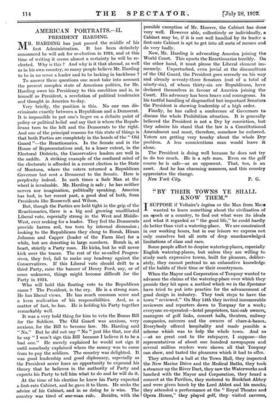AMERICAN PORTRAITS.-II.
PRESIDENT HARDING.
MR. HARDING has just passed the middle of his first Administration. It has been definitely announced he will ask for re-election in 1924, and at this time of writing it seems almost a certainty he will be re- elected. Why is this ? And why is it that abroad, as well as in his own country, so many people believe Mr. Harding to be in no sense a leader and to be lacking in backbone ?
To answer these questions one must take into account the present complex state of American politics, for Mr. Harding owes his Presidency to this condition and is, in himself as President, a revelation of political tendencies and thought in America to-day.
Very briefly, the position is this. No one can dis- criminate exactly between. a Republican and a Democrat. It is impossible to put one's finger on a definite point of policy or political belief and say that is where the Repub- licans turn to the left and the Democrats to the right. And one of the principal reasons for this state of things is that both Parties are completely in the hands of the " Old Guard "—the Reactionaries. In the Senate and in the House of Representatives and, to a lesser extent, in the Electoral Districts, the Conservative leaders are well in the saddle. A striking example of the confused mind of the electorate is afforded in a recent election in the State of Montana, where the voters returned a Republican Governor but sent a Democrat to the Senate. Here is. perplexity indeed. In such times a Safe Man at the wheel is invaluable. Mr. Harding is safe ; he has neither nerves nor imagination, politically speaking. America has had, in her recent past, a good deal of both, from Presidents like Roosevelt and Wilson.
But, though the Parties are held tight in the grip of the Reactionaries, there is a big and growing unaffiliated Liberal vote, especially strong in the West and Middle- West, ever seeking for a leader. They feel the Democrats provide barren soil, too torn by internal dissension ; looking, to the Republicans they clung to Borah, Hiram Johnson and Capper (leader of the Farm bloc) for a while, but are deserting in large numbers. Borah is, at heart, strictly a Party man. He kicks, but he will never kick over the traces. The rest of the so-called Progres- sives, they feel, fail to make any headway against the Conservatives. If this Liberal vote should drift to a third Party, raise the banner of Henry Ford, say, or of some unknown, things might become difficult for the Party in 1924.
Who will hold this floating vote to the Republican cause ? The President, .is the cry. He is a strong man. He has liberal views. He has much common sense and a keen realization of his responsibilities. And, as a matter of fact, he has. He is holding his Party together remarkably well.
It was a very bold thing for him to veto the Bonus Bill for the Soldiers. The Old Guard was anxious, very anxious, for the Bill to become law. Mr. Harding said " No." But he did not say " No " just like that, nor did he say " I won't sign this Bill because I believe it to be a bad one." He merely explained he would not sign it until somebody explained where the money was to come from to pay the soldiers. The country was delighted. It was good leadership and good diplomacy, especially as the President never loses an opportunity to expound his theory that he believes in the authority of Party and expects his Party to tell. him what to do and he will do it.
At the time of his election he knew his Party expected a first-rate Cabinet, and he gave it to them. He seeks the advice of his Cabinet, and in: so doing he is wise. The country was tired. of . one-man. rule.. Besides, with. the possible exception of Mr. Hoover, the Cabinet has done very well. However able, collectively or individually, a Cabinet may be, if it is not well handled by its leader a, first-rate Cabinet is apt to get into all sorts of messes and do very badly.
Now, Mr. Harding is advocating America joining the World Court. This upsets the Reactionaries terribly. Om the other hand, it must please the Liberal element im- mensely. Unperturbed, even jovial at the discomfiture of the Old Guard, the. President goes serenely on his way and. already seventy-three Senators (out of a total of ninety-six), of whom thirty-six are Republicans, have declared themselves in favour of America joining the Court.. His. advocacy has been brave and courageous. In his tactful handling of disgruntled but important Senators the President is showing leadership of a high order. Finally, he has called a conference of Governors to- discuss the whole Prohibition situation. It is generally believed the President is not a Dry by conviction, but; they admire his stand that the law is 'a Constitutional Amendment and must, therefore, somehow .be enforced. Voters are getting very touchy about the whole Dry problem. A less conscientious man would leave it The President is doing well because he does not try to do too much. - He is a safe man. Even on the golf course he is safe—as an opponent. That, too, is an asset. And he has charming manners, and this country appreciates the change.






































 Previous page
Previous page